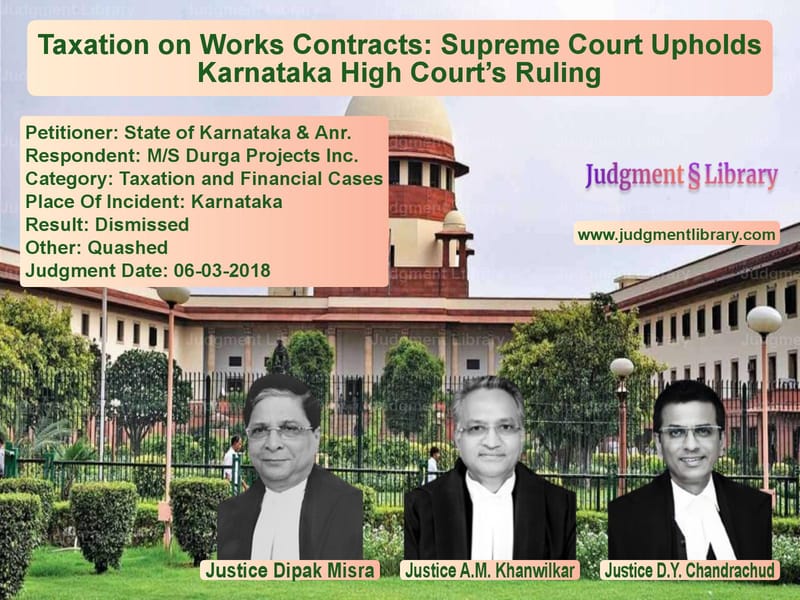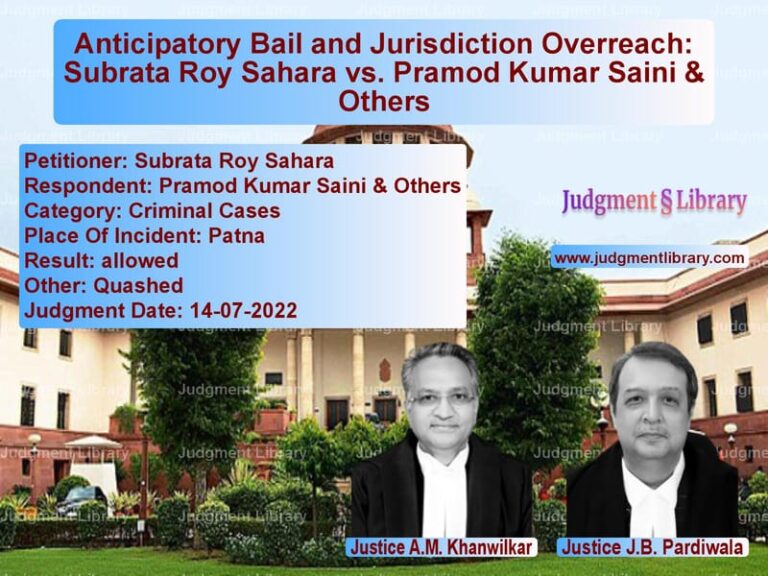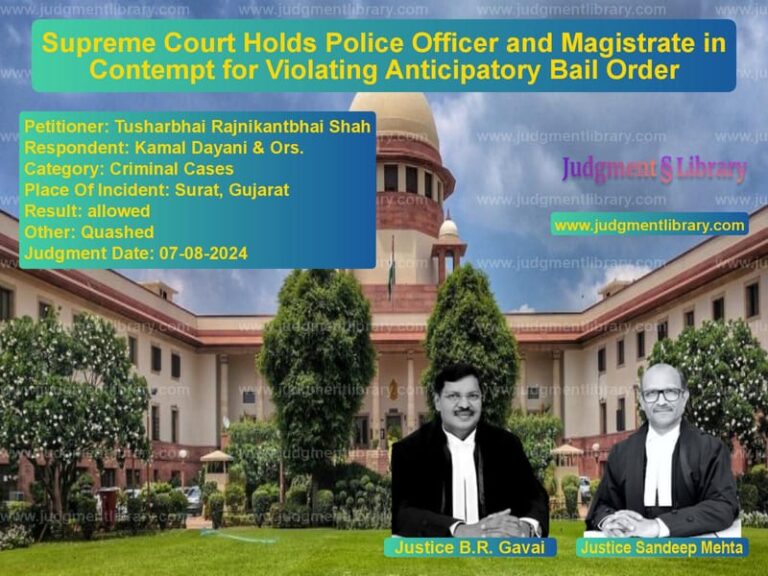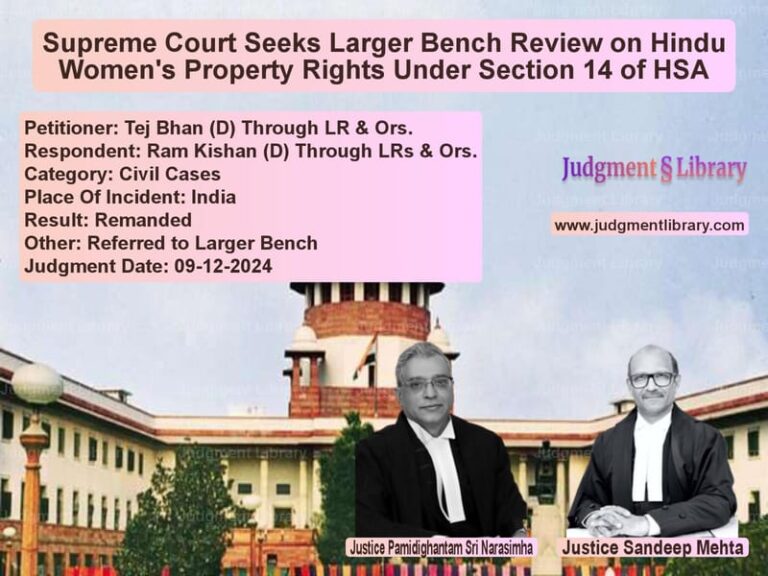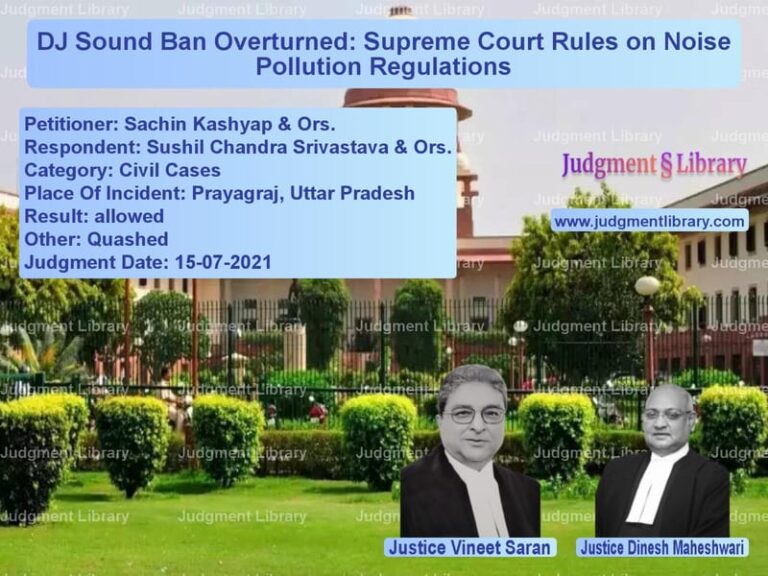Taxation on Works Contracts: Supreme Court Upholds Karnataka High Court’s Ruling
The case of State of Karnataka & Anr. v. M/S Durga Projects Inc. revolves around the taxation of works contracts under the Karnataka Value Added Tax Act, 2003 (KVAT Act). The Supreme Court dismissed the appeal by the State of Karnataka, affirming the Karnataka High Court’s judgment that before April 1, 2006, the state legislature had not provided a uniform rate of tax for works contracts.
Background of the Case
The dispute arose when the respondent, M/S Durga Projects Inc., which was engaged in executing civil works contracts, sought clarification on the rate of tax applicable for works contracts before the introduction of Section 4(1)(c) in the KVAT Act on April 1, 2006. The key facts include:
- The respondent was registered under both the KVAT Act and the Central Sales Tax Act.
- It purchased construction materials like hardware, sand, and bricks from registered and unregistered dealers within and outside Karnataka.
- On January 31, 2006, the respondent sought guidance from the Authority for Advance Clarification and Ruling (AAR) on the applicable tax rate.
- On August 2, 2006, the AAR ruled that before April 1, 2006, there was no specific tax rate for works contracts, so tax should be levied based on the rate applicable to individual goods.
- On December 7, 2006, the AAR further clarified that iron and steel would be taxed at 4% when used in the same form and 12.5% otherwise.
Government’s Revision and High Court’s Ruling
The Commissioner of Commercial Taxes later revised the AAR’s ruling, stating that works contracts constituted a deemed sale of goods in an incorporated form, distinct from normal sales. The High Court, however, ruled in favor of M/S Durga Projects Inc., holding that:
- The KVAT Act did not provide for a uniform tax rate on works contracts before April 1, 2006.
- The rate of tax had to be applied based on individual goods used in the execution of the works contract.
- The state could not impose a uniform rate retroactively.
Arguments by the Petitioner (State of Karnataka)
The State of Karnataka argued that:
- The KVAT Act provided for taxation on works contracts even before April 1, 2006.
- Under Section 4(1)(b), all goods not specified in other schedules were subject to a uniform tax rate of 12.5%.
- The intent of the legislature was to tax works contracts at a uniform rate, which became explicit only after April 1, 2006.
- Allowing different tax rates for different goods in a works contract would render the taxation scheme unworkable.
Arguments by the Respondent (M/S Durga Projects Inc.)
The respondent countered that:
- Before April 1, 2006, the KVAT Act did not specify a uniform rate for works contracts.
- Each item used in a works contract was to be taxed at the applicable rate for that item.
- The amendment in 2006 introduced a new taxation method that could not be applied retrospectively.
- The principles laid down in Gannon Dunkerley & Co. v. State of Rajasthan permitted state legislatures to tax works contracts at a uniform rate, but Karnataka had not done so until 2006.
Supreme Court’s Analysis and Ruling
The Supreme Court analyzed the KVAT Act’s provisions and held that:
1. Works Contracts Were Taxable Before April 1, 2006
The Court observed that the KVAT Act, as originally enacted, provided for the taxation of works contracts. However, it did not prescribe a uniform tax rate until the amendment in 2006.
2. Section 4(1)(b) Was a Residual Entry
The Court rejected the state’s argument that works contracts were taxed uniformly under Section 4(1)(b), stating:
“The expression ‘other goods’ in Section 4(1)(b) refers to goods not covered under the specific schedules. It does not automatically apply to goods in a works contract.”
3. Taxation Before April 1, 2006, Was Based on Individual Goods
The Court upheld the High Court’s view that:
“The sale under the works contract is a deemed sale of transfer of goods alone and is not different from a normal sale. Tax has to be levied on the price of goods and material used in the works contract as if there was a sale of goods and materials.”
4. Legislature Introduced Uniform Taxation Only After 2006
The Court noted that:
“If the legislature intended to impose a uniform tax rate before 2006, there would have been no need to introduce Section 4(1)(c) in the 2006 amendment.”
5. No Retrospective Application of Taxation
The Court ruled that the state could not impose a uniform rate retroactively, stating:
“The amendment in 2006 cannot be interpreted to apply retrospectively to tax works contracts uniformly before its enactment.”
Final Verdict
The Supreme Court dismissed the appeals, ruling:
“The State of Karnataka’s challenge to the High Court’s order lacks merit. The High Court’s interpretation of taxation under the KVAT Act before April 1, 2006, is correct.”
Key Takeaways
- The Karnataka Value Added Tax Act did not impose a uniform tax rate on works contracts before April 1, 2006.
- Before the amendment, tax was levied based on the applicable rate for each item used in a works contract.
- The Supreme Court upheld the High Court’s ruling that retrospective application of a uniform tax rate was impermissible.
- The decision clarifies how works contracts were taxed before and after the 2006 amendment in Karnataka.
- The ruling is significant for businesses engaged in construction and civil works contracts, ensuring that they are taxed based on laws applicable at the relevant time.
Conclusion
The Supreme Court’s ruling provides clarity on how taxation of works contracts was handled under the KVAT Act before the 2006 amendment. The judgment confirms that taxation should be based on the law as it existed at the time of the transaction and that legislative changes cannot be applied retroactively unless expressly stated.
This ruling protects businesses from arbitrary tax demands and ensures consistency in the interpretation of tax laws.
Petitioner Name: State of Karnataka & Anr.Respondent Name: M/S Durga Projects Inc.Judgment By: Justice Dipak Misra, Justice A.M. Khanwilkar, Justice D.Y. ChandrachudPlace Of Incident: KarnatakaJudgment Date: 06-03-2018
Don’t miss out on the full details! Download the complete judgment in PDF format below and gain valuable insights instantly!
Download Judgment: State of Karnataka & vs MS Durga Projects I Supreme Court of India Judgment Dated 06-03-2018.pdf
Direct Downlaod Judgment: Direct downlaod this Judgment
See all petitions in Income Tax Disputes
See all petitions in Tax Evasion Cases
See all petitions in Tax Refund Disputes
See all petitions in Judgment by Dipak Misra
See all petitions in Judgment by A M Khanwilkar
See all petitions in Judgment by Dhananjaya Y Chandrachud
See all petitions in dismissed
See all petitions in Quashed
See all petitions in supreme court of India judgments March 2018
See all petitions in 2018 judgments
See all posts in Taxation and Financial Cases Category
See all allowed petitions in Taxation and Financial Cases Category
See all Dismissed petitions in Taxation and Financial Cases Category
See all partially allowed petitions in Taxation and Financial Cases Category

